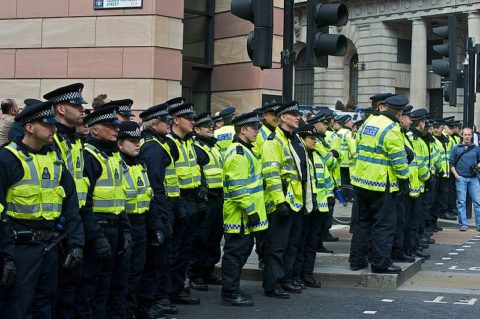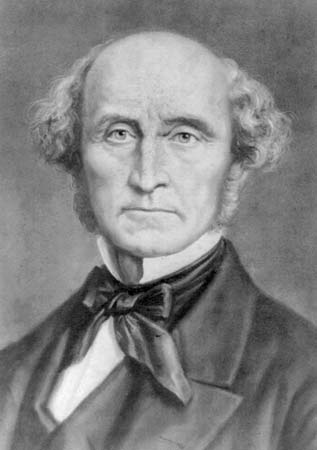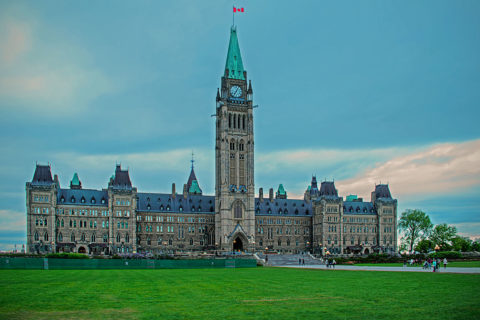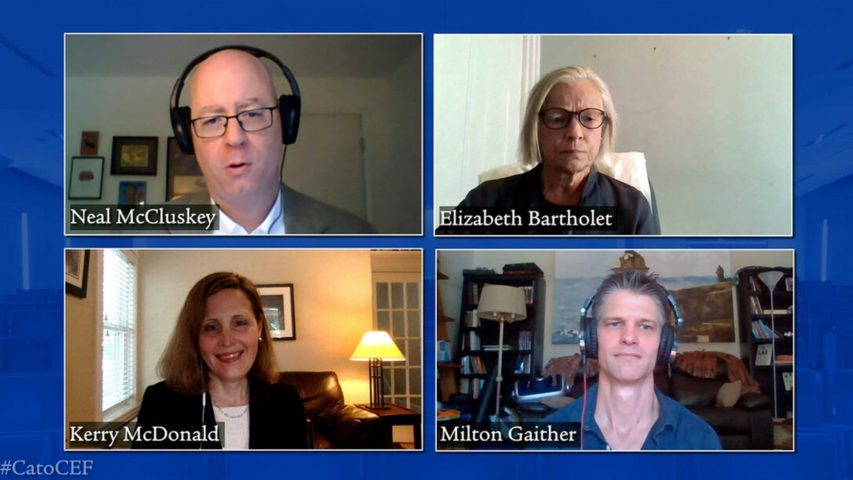… I offered a very limited defense of the History Biz. It’s not just that they’re rabid Leftists, I said. I mean, yeah, they are, no denying that, but outright “writing the conclusion before you even start asking the question”-type fraud, Michael Bellesisles-type fraud, is a lot rarer than you probably think.
Bellesisles, you might recall, is the guy whose revolutionary revisionist thesis was that the Founders weren’t really all that enthusiastic about guns, and didn’t own that many, and that whole 2nd Amendment thing was just an afterthought. Yeah, right. That one was written conclusion first, and since no remotely objective look at the evidence could ever possibly support it, he resorted to making lots of “evidence” up. But the reaction of the rest of the profession was interesting: They lauded Bellesisles to the skies. He won the Bancroft Prize for his work, which is the biggest one you can get in American history. Now, I’m sure you’re saying “of course they praised him, he was telling them exactly what they wanted to hear!”, and you’re right …
… but only to a point. Because eggheads are — as you might imagine — the pettiest, most envious bunch of little bitches this side of a junior high cheerleading squad, there’s no piece of research so meticulous, no conclusion so solid, that someone isn’t going to tear into it in one of the professional journals, for base personal reasons if no other. Lest you think I’m kidding, I personally know of a woman at a big league school whose husband was seduced, and her marriage ruined, by an open, obnoxious lesbian colleague, all because she, the hetero, had dared to question some of the lesbian’s work at a conference in their mutual field.
That’s the level of pettiness we’re dealing with here. And I can’t say for absolute certain that Bellesisles received no criticism whatsoever; he doesn’t work in my field, so even though I was certain that Arming America was bullshit of the purest ray serene, it wasn’t my problem, professionally speaking. But whatever, point is, in my fairly well-informed opinion, merely “telling them what they want to hear” doesn’t account for the entire profession ignoring the huge, blinking, neon red flags surrounding Arming America. Rather, I suggest it’s more of a Pauline Kael thing.
I actually kinda pity Kael — much like John Montagu, the 4th Earl of Sandwich, she was a fairly big wheel back in her day, but if she’s known at all now, it’s for something entirely peripheral to her life’s work. In Kael’s case, it’s her declaration that it was impossible for Richard Nixon to have won in 1972, since “nobody I know voted for him” (it was one of the biggest blowouts in American electoral history). The Arming America thing is, I think, like that — nobody in academia owns a gun, or knows anyone who owns a gun, or knows anyone who knows anyone who owns a gun. So, yeah, they know all the scary statistics about how there are sixty gorillion more guns than people in America, but all of that iron belongs to the Dirt People, far away over the horizon. They’d never in a million years even be in the same zip code as someone who thinks Arming America was absurd on its face. Hence, it never occurred to them to question it.
It helped that Bellesisles was telling them what they wanted to hear, no doubt, but the main reason nobody challenged it was that they lacked the cognitive toolkit to even consider the possibility he might be wrong.
Severian, “Are They Trying to Lose?”, Rotten Chestnuts, 2021-07-15.
November 6, 2021
QotD: Michael Bellesisles
October 22, 2021
Explaining why British police clearly favour road-blocking protestors over the rights of ordinary Britons
In The Critic, Andrew Tettenborn believes it can be traced back to a change in the oath that new police constables take and the changed emphasis in police training to support that change:
Last week Insulate Britain magnanimously announced it would suspend its forcible road-blocking campaign. Apart from noting the impudence of this announcement (remember the IRA sanctimoniously calling its Christmas ceasefires, as if this were something we should be grateful for?), commentators on Twitter, the tabloid press and indeed many of the general public, have found another question troubling. Why, in the face of deliberate criminality aimed at discommoding ordinary people (most of whom will have been less well-off than many of the protesters), did the police hold back, at times apparently chatting with the obstructionists and threatening with arrest any exasperated driver who tried to take steps to remove them? We aren’t told, but we can make some educated guesses.
[…]
Nearly twenty years ago in 2002, there was a subtle, little-reported but very symbolic change in the oath sworn by all constables on appointment. Instead of the 19th century undertaking to serve the Queen “without fear or favour, malice or ill-will” in the course of keeping the peace and preventing crime, there is now a much more tendentious promise preceding the duty to keep the peace: namely, to act with “fairness, integrity, diligence and impartiality, upholding fundamental human rights and according equal respect to all people”. This requirement, thoroughly reflected as it is in police training today and imbued in policing culture, has two effects.
One is that all officers must keep at the front of their minds not only the law of the land but also two other guidelines: considerations of fairness and equality (whatever those mean), and human rights laws — something peculiarly complex and frequently opaque, even to lawyers. Human rights laws involve a subtlety well beyond the average constable called out to police a tense situation. Put yourself in the position of a policeman, faced with a choice whether to intervene in a case involving illegality and an intent to inconvenience people, but where no-one is actually engaging in violence — exactly the situation with Insulate Britain or Extinction Rebellion. You might well think that, if you wish to avoid future trouble and possible complaints of discrimination or unfairness, discretion and inaction would be the better part of valour.
Thanks to the pervasiveness of human rights culture, the constable’s traditional function of upholding the law ceases to be a black-and-white matter, and becomes a potential mire of conflicting duties. Even if the letter of the law says you should arrest a middle-aged protester or at least drag them off the M25 to prevent them obstructing it, there is always a possibility that someone somewhere will hold that this was contrary to their human rights. Once again, a cautious police officer intent on avoiding disciplinary hearings and a possible black mark, may well conclude that it is better to let sleeping dogs lie (at least for the moment), condone the illegality and avoid possible violence.
The police constable on the scene is extremely well advised to avoid doing anything that might possibly be construed as infringing on the human rights of everyone at the scene, for fear of becoming the scapegoat if clever lawyers convince a judge or jury that the police acted contrary to their revised oath.
September 24, 2021
QotD: The LGBT advocacy group Stonewall proves Hoffer right — “every great cause begins as a movement, becomes a business and eventually degenerates into a racket”
There is a law of nature that governs campaigning groups and charities, which is that an organisation set up to deal with a particular problem will always find a way to exist even after that problem has been addressed.
The reason is simple: by the time an issue has been solved, or almost solved, the business is at its peak. Employees’ salaries and pensions are at stake, reputations have been built and influence has been secured. And so it is that Eric Hoffer’s great insight is fulfilled: every great cause begins as a movement, becomes a business and eventually degenerates into a racket.
Very few causes have degenerated into a racket so completely as the former gay-rights group known as Stonewall. When it was founded in 1989, gay rights in Britain, as across Europe, had some way to go to reach equality. Back then, there was a different age of consent for homosexuals and heterosexuals, homosexuals did not have the right to marry or to have their partnerships legally recognised and, most pertinently, a Conservative government had made it impossible for young gay people to be in any way informed about their sexuality during their time at school.
There was certainly a long way to go, and Ian McKellen, Matthew Parris, Simon Fanshawe and the rest of the group’s founders faced an uphill battle for many years. But it was a battle which they helped to win.
Once most of their objectives had been achieved, though, what were Stonewall to do? There were several options in front of them. The most obvious, one might think, would have been to scale down and remain in place to deal with residual issues, such as the existence of homophobia in schools and other remaining pockets of society.
Douglas Murray, “How Stonewall sacrificed gay rights”, UnHerd, 2021-05-25.
August 9, 2021
June 19, 2021
Proposed new firearms rules “… are ultimately unenforceable, and […] they are dangerous end-runs around due process that threaten fundamental rights”
J.D. Tuccille reports on the latest US federal government proposals on changes to firearm regulations:
As expected, the Biden administration released proposed new rules for pistol braces and model legislation for “red flag” laws that make it easier to confiscate privately owned firearms. Also as expected, the proposals are ludicrous. On the one hand, they are pointless and nitpicky rules that are ultimately unenforceable, and on the other hand they are dangerous end-runs around due process that threaten fundamental rights. Taken together, they illustrate the unserious nature of gun regulations which are crafted more to appeal to political audiences than to achieve positive results.
The silliness inherent in this sort of rulemaking is apparent from the Department of Justice’s announcement of “a notice of proposed rulemaking that makes clear that when individuals use accessories to convert pistols into short-barreled rifles, they must comply with the heightened regulations on those dangerous and easily concealable weapons.”
For those new to this controversy, stabilizing braces were developed to help disabled veterans more accurately shoot pistols (usually those built around AR-15 receivers) one-handed. The “problem” is that many resemble shoulder stocks and can be used in that role. By no means does an attachment that lets a pistol be fired from the shoulder make it especially “dangerous and easily concealable.” Instead, it makes it less concealable since it has a brace sticking off the back. Braces do render pistols more accurate, which could be interpreted as dangerous if you’re upset by shooters hitting where they aim.
But a pistol that can be fired from the shoulder is arguably a short-barreled rifle under the National Firearms Act (NFA), and subject to special restrictions, taxes, and registration requirements that don’t apply to regular pistols or regular rifles, but do apply to (among other weapons) rifles with barrels shorter than 16 inches. These regulations are not evidence that short-barreled rifles are particularly dangerous, but that, like many laws, the NFA is thoroughly idiotic.
Braces have been treated as legal devices for years but have recently been targeted by the sort of people who see advantage in pretending that a firearm with a buttstock and a short barrel is more “dangerous and easily concealable” than stock-less pistols and long-barreled rifles. In compliance with White House direction, proposed rules from the Bureau of Alcohol, Tobacco, Firearms, and Explosives (ATF) would impose new requirements to determine if braced pistols achieve Great Pumpkin-level sincerity, or are super-dangerous and concealable short-barreled rifles in disguise.
Among other tests, the rule would set the maximum length of a pistol at 26 inches (because 27 inches is super-dangerous and concealable). These tests add up to a four-point assessment, ranging from “1 point: Minor Indicator (the weapon could be fired from the shoulder)” to “4 points: Decisive Indicator (the weapon is designed and intended to be fired from the shoulder)” with four points the ultimate sign that a firearm crosses the line into very naughty territory indeed.
[…]
But foolish stabilizer brace rules affect mostly disabled shooters and fanciers of a particular type of firearm. Red flag laws affect potentially any gun owner by allowing for property seizures and confrontations with law enforcement without due process.
Red flag laws “make it easier for states to craft ‘extreme risk protection orders’ authorizing courts to temporarily bar people in crisis from accessing firearms,” insists the Department of Justice. “By allowing family members or law enforcement to intervene and to petition for these orders before warning signs turn into tragedy, ‘extreme risk protection orders’ can save lives.”
Maybe such orders “can save lives”—all sorts of restrictions on personal liberty theoretically “can save lives” if that’s your only criteria. But the model legislation proposed by the Biden administration requires same-day issuance of orders that “prohibit the respondent from possessing, using, purchasing, manufacturing, or otherwise receiving a firearm” with a hearing to be held only after the fact. That certainly deprives those affected of their rights without due process of any sort before cops show up on their doorsteps to search the premises and confiscate property.
March 31, 2021
QotD: The first and only “inalienable” right
Oversimplifying a bit for clarity, “republican” political philosophy after Hobbes is an attempt to use Hobbes’s tools and methods without arriving at his conclusions. That baloney about “inalienable rights” in the US Declaration of Independence is the most famous of these attempts. If you want to know how we got from there to here – from the Founders to the Tyranny of the Intersectional Genderfluids – just recall what those supposedly “inalienable” rights are: Life, Liberty, the Pursuit of Happiness.
It would’ve been far better to have kept the trio in Locke’s original words – life, liberty, and property – but even that wouldn’t have saved us, because the proposition is flawed from the beginning. The full quote is:
We hold these truths to be self-evident, that all men are created equal, that they are endowed by their Creator with certain unalienable Rights, that among these are Life, Liberty and the pursuit of Happiness …
… and pretty much all of that is wrong.
As we’ve seen, it was a major part of Hobbes’s project to prove that men do in fact have such rights, because it’s not at all “self-evident.” That was the whole point of the Wars of Religion – heretics have NO rights, because they have put themselves beyond the pale of the human community. For the Wars of Religion to end, political legitimacy had to be secularized.
That was Hobbes’s goal. That’s what the “State of Nature” thought experiment was about. Does man has any rights in himself, that flow only from his existence as a human being? In other words, does he have rights NOT endowed by his Creator?
Hobbes argued that we DO have such rights, of course … but, crucially, we only have the full exercise of them in the State of Nature. For Hobbes, all rights are, at bottom, the right to self-defense. Getting out of the State of Nature involves laying at least part of that right down – “alienating” it, in the Latinate English of the 17th century – creating in the process a “corporate person” who “represents” us all. Far from being “inalienable,” then, Life and Liberty, at least, have to be alienated, at least to some degree, if civilization is to exist at all …
… at least according to Hobbes, and do you see what I mean about people trying to adopt his terms while dumping his conclusions?
Hobbes had plenty of examples to hand, writing as he was in the last, nastiest phase of the Wars of Religion. According to Hobbes, the Leviathan – who, let’s recall, can be a Senate or something just as easily as a monarch – absolutely has the right to your life and liberty, since your voluntary surrender of them is what creates the Leviathan in the first place. How else could wars be fought in the gunpowder age? A medieval king leading his personal affinity into battle didn’t have to worry about political theory. An Early Modern king, fielding armies of tens of thousands, did. Without an animating ideology, they’re just mercenaries – ask Machiavelli how that works out.We’ll skip over that “pursuit of happiness” crap, since that’s probably just Jefferson’s noodle-headed way of alluding to Classical political theory, and circle back to the start: “all men are created equal.” As we’ve seen, this was central to Hobbes’s “State of Nature” thought experiment … but, as is obvious to anyone with real-world experience, it only applies there.
Severian, “Hobbes (II)”, Founding Questions, 2020-12-11.
January 20, 2021
“Canada Post … is not to act as the censor of mail or to determine the extent of freedom of expression in Canada”
Colby Cosh on a recent incident in Regina where a Canada Post employee took it upon himself to act as a local censor for people on his delivery route:
Today’s idiot of the day is not, perhaps surprisingly, the Regina postman who got suspended for refusing to deliver the Epoch Times, the oddball anti-communist newspaper that’s affiliated with China’s persecuted Falun Gong religious movement. Don’t get us wrong: Ramiro Sepulveda is clearly a bit of a nitwit. He seems to believe that a newspaper founded by commie-hating Chinese-Americans is designed to provoke hatred toward “Asian communities in North America.”
Sepulveda didn’t want to deliver free copies of the Times to non-soliciting customers because it “spits lies.” Perhaps regrettably, the strong reaction by Canada Post means that our junk mail, quite a lot of which consists of boastful missives from politicians, is not destined to be fact-checked and aggressively suppressed by the corporation’s rank and file.
Sepulveda was properly punished for not doing his job. And Canada Post used the opportunity to promote its content-neutrality as an agent of the state, although it did not quite dare to use the phrase “statutory monopoly.” In a statement to the broadcasters who reported on Sepulveda’s off-piste personal fact-checking, the agency said: “Canada Post is obligated to deliver any mail that is properly prepared and paid for, unless it is considered non-mailable matter. The courts have told Canada Post that its role is not to act as the censor of mail or to determine the extent of freedom of expression in Canada.”
They might have added that access to the mail has been denied to individuals for spreading hatred only a handful of times in the history of the country; this, too, is as it ought to be, and it is certainly not postal employees who ought to be improvising such bans. Ideally, all postmen would be doing their best not to create the suspicion that they are eyeballing what is sent to our homes with the intention of ringing up a reporter and causing a fuss. Say what you like about these poor toilers: most of them never give us any reason to doubt their discretion.
November 18, 2020
The Consumer Privacy Protection Act
Michael Geist looks at Bill C-11, which was introduced by Navdeep Bains on Tuesday:
Canada’s privacy sector privacy law was born in the late 1990s at a time when e-commerce was largely a curiosity and companies such as Facebook did not exist. For years, the privacy community has argued that Canada’s law was no longer fit for purpose and that a major overhaul was needed. The pace of reform has been frustrating slow, but today Innovation, Science and Industry Minister Navdeep Bains introduced the Consumer Privacy Protection Act (technically Bill C-11, the Digital Charter Implementation Act), which represents a dramatic change in how Canada will enforce privacy law. The bill repeals the privacy provisions of the current Personal Information Protection and Electronic Documents Act (PIPEDA) and will require considerable study to fully understand the implications of the new rules.
This post covers six of the biggest issues in the bill: the new privacy law structure, stronger enforcement, new privacy rights on data portability, de-identification, and algorithmic transparency, standards of consent, bringing back PIPEDA privacy requirements, and codes of practice. These represent significant reforms that attempt to modernize Canadian law, though some issues addressed elsewhere such as the right to be forgotten are left for another day. Given the changes – particularly on new enforcement and rights – there will undoubtedly be considerable lobbying on the bill with efforts to water down some of the provisions. Moreover, some of the new rules require accompanying regulations, which, if the battle over anti-spam laws are a model, could take years to finalize after lengthy consultations and (more) lobbying.
August 24, 2020
How to rectify a serious error the Founding Fathers made in the US Constitution
In the latest Libertarian Enterprise, L. Neil Smith suggests that despite his respect for the founding fathers, they made a couple of serious mistakes in drafting the Constitution and it needs fixing quickly:
Founders’ Mistake Number Two: lies in the enumeration of the powers of Congress, to wit:
“They [congress] shall in all Cases, except Treason, Felony and Breach of the Peace, be privileged from Arrest during their Attendance at the Session of their respective Houses and in going to and returning from the same; and for any Speech or Debate in either House, they shall not be questioned in any other Place.”
With those fifty-four words, the Founding Fathers gave birth to a permanent criminal class, as surely as the city councils of Seattle, Minneapolis. Philadelphia, New York, and Portland. Even “treason, felony, and breach of the peace” are for all practical purposes excepted, now, or three quarters of these miscreants would be languishing in prison. That heinous, stupid clause must be repealed or rewritten at once.
For many years, I have advocated reopening Alcatraz strictly for government criminals, although lately it occurs to me that Antarctica might be even better. Cash-poor Russia and the other two-for-a-nickel satrapies that lay claim to slivers of that frozen continent would give them up for thirty-seven cents and a good bus token. And I kind of like the ring of “McMurdo Sound Federal Penitentiary”.
But, as usual, I have, once again, digressed.
Another cure — with similar delightfully frostbitten consequences — might be to incorporate United States Code, Sections 241 and 242 directly into the Bill of Rights, probably as Amendment Zero. They establish the crimes of depriving folks of their rights “under color of law”, conspiring to deprive them of their rights under color of law, and prescribe extremely specific penalties.
To my knowledge, those laws are never properly applied, and that is a travesty and a tragedy. Make them an Amendment, and they might prove more effective. I would consider every American deprived of his or her rights to represent a separate punishable offense. How about three billion years in the freeze-dried slammer, Nancy, for your decades of malfeasance, misfeasance, nonfeasance, upfeasance, and downfeasance as a member in evil standing of the Viet Congress?
August 23, 2020
The right of asylum
Tim Worstall is writing here about the situation in the United Kingdom, with would-be asylum claimants risking their lives to cross the English Channel so they can legally claim asylum in Britain, but exactly the same situation should apply with claimants entering Canada from the United States:

An asylum seeker, crossing the US-Canadian border illegally from the end of Roxham Road in Champlain, NY, is directed to the nearby processing center by a Mountie on 14 August, 2017.
Photo by Daniel Case via Wikimedia Commons.
Everyone at even risk – let alone reality – of substantial discrimination in their home country has the right, the right, to asylum. This is one of those international things that we should indeed agree with too. Few of us have anything but contempt for those who wouldn’t let Holocaust fleeing Jews (and or gypsies, gays, whatever, it’s just that we have substantial documented evidence about Jews who were turned away) tarnish their national doormats. Few of us think those who abused such limitations are anything but heroes. I even know of one monk who married Jewesses multiple times to bring them out by train. Umm, married multiple people, not one many times. People working within the too restrictive rules even gave us one of the finest moments of TV ever.
So, asylum, good thing.
And here’s the next thing. That right is restricted. To claiming it in the first safe place you get to. This has some oddities, if you leave Sudan by plane and step off at Heathrow then the UK is where you can – righteously – claim asylum. If you come by land then you have passed through many safe places before reaching the UK. You don’t have the right to asylum in the UK and, to be strict about it, don’t even have the right to apply.
So, people drowning in the Channel because they have to make their asylum application once in the UK? This could be true of those who are being oppressed in France. It’s not true of anyone not being oppressed in France. So there is not that need to take the open boat the 26 miles.
Sure, there’s the desire, we all understand that. But that’s a desire, not a right to asylum.
Here in Canada, we had this arrangement with the American government under the Canada-United States Safe Third Country Agreement, which our Federal Court struck down last month — incorrectly, in my opinion — as being in violation of section 7 of the Canadian Charter of Rights and Freedoms. The court allowed six months for the federal government to act, but as we all know, the federal government is unlikely to do anything as politically radioactive as passing legislation that could — and would — be seen as anti-refugee.
June 27, 2020
Maximilien Robespierre: The Reign of Terror
Biographics
Published 5 Jul 2018Maximilien Robespierre promised to usher a fairer, more representative form of government to the French people. What they got was a reign of terror that saw thousands facing the horror of the guillotine.
Visit our companion website for more: http://biographics.org
Credits:
Host – Simon Whistler
Author – Steve Theunissen
Producer – Jack Cole
Executive Producer – Shell HarrisBusiness inquiries to biographics.email@gmail.com
June 20, 2020
Opposition to home schooling is merely a side-issue for those who want government to control everything
Kerry McDonald recently took part in a debate with a Harvard academic who has called upon governments to ban homeschooling. She’s written up some of the things she took away from the discussion and from the many questions submitted before the event:
While this event was framed as a discussion about homeschooling, including whether and how to regulate the practice, it is clear that homeschooling is just a strawman. The real issue focuses on the role of government in people’s lives, and in particular in the lives of families and children. In her 80-page Arizona Law Review article that sparked this controversy, Professor Bartholet makes it clear that she is seeking a reinterpretation of the US Constitution, which she calls “outdated and inadequate,” to move from its existing focus on negative rights, or individuals being free from state intervention, to positive rights where the state takes a much more active role in citizens’ lives.
During Monday’s discussion, Professor Bartholet explained that “some parents can’t be trusted to not abuse and neglect their children,” and that is why “kids are going to be way better off if both parent and state are involved.” She said her argument focuses on “the state having the right to assert the rights of the child to both education and protection.” Finally, Professor Bartholet said that it’s important to “have the state have some say in protecting children and in trying to raise them so that the children have a decent chance at a future and also are likely to participate in some positive, meaningful ways in the larger society.”
It’s true that the state has a role in protecting children from harm, but does it really have a role in “trying to raise them”? And if the state does have a role in raising children to be competent adults, then the fact that two-thirds of US schoolchildren are not reading proficiently, and more than three-quarters are not proficient in civics, should cause us to be skeptical about the state’s ability to ensure competence.
I made the point on Monday that we already have an established government system to protect children from abuse and neglect. The mission of Child Protective Services (CPS) is to investigate suspected child abuse and punish perpetrators. CPS is plagued with problems and must be dramatically reformed, but the key is to improve the current government system meant to protect children rather than singling out homeschoolers for additional regulation and government oversight. This is particularly true when there is no compelling evidence that homeschooling parents are more likely to abuse their children than non-homeschooling parents, and some research to suggest that homeschooling parents are actually less likely to abuse their children.
Additionally, and perhaps most disturbingly, this argument for more state involvement in the lives of homeschoolers ignores the fact that children are routinely abused in government schools by government educators, as well as by school peers. If the government can’t even protect children enrolled in its own heavily regulated and surveilled schools, then how can it possibly argue for the right to regulate and monitor those families who opt out?
June 10, 2020
“Gender critical” feminism
Barbara Kay finds herself in agreement with an academic who, having come from a Marxist and radical feminist background, she would not normally have much in common:
Kathleen Lowrey, associate professor of anthropology at the University of Alberta, ascribes much of her intellectual formation to Marxism and radical feminism. Not, I think my regular readers would agree, someone with whom I would normally have a great deal in common. And yet, in this strange cultural moment, Prof. Lowrey and I find ourselves amicably united in the service of a mutually revered ideal. I write this column with ardent sympathy for her in her present predicament.
Academics’ time is generally split 40/40/20 amongst, respectively, research, teaching and “service” to their community — meaning committees, mainly. Until late March, Lowrey served as associate chair for undergraduate programs on behalf of the department of anthropology. Following anonymous complaints about her views from one or more students to the university’s office of safe disclosure and human rights, as well as to the dean of students, Lowrey was asked to resign. She was not given a precise reason, only told that because she holds “gender critical” opinions, she was making the learning environment “unsafe” for the anonymous complainants who felt that her views caused them “harm.” (It’s not clear — Lowrey believes it is doubtful — that the complainants were even taking her courses.)
“Gender critical” refers to what was shortly ago normative feminism doctrine in considering biological sex of primordial importance in fighting for women’s rights. Where the traditional rights of biological women collide with asserted rights of trans women — sport, intimate spaces, rape crisis centres, prisons — gender-critical feminists join with conservatives like me in insisting that biological women’s rights must prevail: for the sake of their safety, privacy and right to a level playing field.
Until what seems like a few minutes ago, there was nothing controversial about this opinion. But now there is. The only “correct” opinion to hold is that gender expression trumps biology in any rights-based claims. And in academic circles, Lowrey’s views, which she is at no pains to hide on campus and off, are a form of apostasy that cries out for punishment.
May 19, 2020
The Karenist coup
L. Neil Smith on our current self-inflicted plight:
We find ourselves here, in this particular time and this particular place in the history of our republic, because of a 239-year-old oversight made by the Founding Fathers, in that the first ten amendments to the United States Constitution, commonly known as the Bill of Rights (the name itself is a mistake), contain no penalty clause for those — politicians, bureaucrats, policemen — who violate them. I’m not entirely sure it was accidental, but, as a result, they are violated daily, hourly, as a matter of course, and this Corona Virus farce — many others come to mind — is simply the most recent and most preposterous example.
(The name itself is an error because this document is not a mere list of privileges that the government generously lets the people exercise. Quite the opposite, it is a list of things that the government is absolutely forbidden to do It should have been called the “Bill of Limits”. And if the Founders, who had just fought and won a desperate, bloody war against the world’s most brutal and rapacious super-power, hadn’t meant them to be absolute, then why — for all you “living document” idiots out there — would they have even bothered to write them down?)
All over this bruised and battered country, a flock of mean, moronic, petty tyrants have issued illegal orders to those they clearly regard as the peasantry: stay home, avoid your fellow human beings, and above all, shut down the Machinery of Freedom which we know as capitalism. If it’s ever allowed to start up again, it must strictly be on terms that are essentially Marxist in character. No mere individual can ever again scratch his ass without written government approval and permission. In effect, the left has the revolution — as usual, achieved by somebody else — it has wanted for 180 years, since the days of Pierre-Joseph Proudhon.
What’s more, many otherwise decent and intelligent folks are out there begging for their rulers to let them be free again. I find that repulsive and unAmerican. And to those boobies (including Sean Hannity and Joy Behar) blubbering about patriots bring their weapons to demonstrations, listen up: the Founders meant the government to be intimidated by the people, you hapless buffoons.
My bottom line, here, is that, in the short run, we must free ourselves — now — from what we have to call Faucism. Scientific pleaders like the dictatorial doctor must be made painfully aware that when their pronouncements have clear political and economic consequences, their protests of innocence sound a bit too much like “I was just following orders”.
April 23, 2020
Trial by jury
Peter Hitchens recounts the essential role of the jury system in the evolution of the English (and, by inheritance, the Australian, Canadian, and even American) constitutional rights of the individual, which today seems to be in peril:
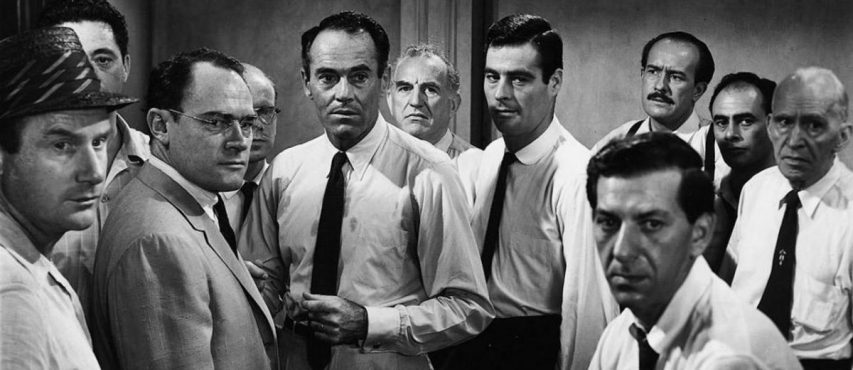
A still from the 1957 movie Twelve Angry Men, directed by Sidney Lumet, starring Henry Fonda, Lee J. Cobb, and Martin Balsam.
Am I going to have to fall out of love with juries? For decades I have defended these curious committees, which can ruin a man’s life in an afternoon. It has been a romance as much as it has been a reasoned position. Most people get their best lesson in jury trials from the 1957 movie Twelve Angry Men. In that version, a single determined juror, played by Henry Fonda, gradually wins the rest of the panel round to an acquittal, at great cost in emotion and patience. But what really won my heart was Thomas Macaulay’s account of the Trial of the Seven Bishops, in which a London jury defied the wishes of the would-be autocrat King James II in 1688. It was an astonishing event, a monarch’s authority challenged by — of all unlikely things — a collection of Anglican prelates. Their acquittal, perhaps more than anything else, led to James’s fall a few months later. It was the beginning of true constitutional monarchy in Europe, the genesis of the English Bill of Rights and the forerunner of the very similar American document of the same name. It could not have happened without a jury.
For without a jury, any trial is simply a process by which the state reassures itself that it has got the right man. A group of state employees, none of them especially distinguished, are asked to confirm the views of other state employees. With a jury, the government cannot know the outcome and must prove its case. And so the faint, phantasmal ideal of the presumption of innocence takes on actual flesh and bones and stands in the path of power. Juries grew up in England almost entirely by happy accident, and no government would nowadays willingly create them where they do not already operate. A brief fashion for them in 19th-century Europe was swiftly stamped out by governments that understood all too well how much they limited their power. I believe the last true Continental juries, sitting in the absence of a judge, were abolished in France in 1940 by the German occupation authorities. People in Anglosphere countries, unaware that true independent juries rarely exist outside the English-speaking world, have no idea what a precious possession they are.
I remember actually pounding the arm of my chair with delight as I read Macaulay’s account of the response of the bishops’ attorney, Francis Pemberton, when threatened by the chief Crown prosecutor, the solicitor general: “Record what you will. I am not afraid of you, Mister Solicitor!” So this was England after all, and even the majesty of the Stuart Crown could not overawe the defense. This was wholly thanks to the fact that the trial took place before a jury — which duly acquitted the bishops of “seditious libel,” the ludicrous charge by which James had hoped to crush opposition to his plans to reverse the Reformation. Without a jury, the king would of course have won his case, and England would have gone down the road to absolutism (already followed in France, Prussia, Russia, and the Habsburg dominions) with incalculable consequences for the whole world. Instead we had what came to be called the Glorious (or Bloodless) Revolution.
And my blood still runs faster when I recall this and other moments at which the mere existence of juries has made us all more free. Yet I also have terrible doubts. Is the independence of juries possible in the modern world, in which the English Bill of Rights is all but forgotten and a new dispensation reigns? All too often, I read reports of trials in my own country that fill me with doubt. I did my fair share of court reporting as an apprentice journalist many years ago, and I have a good understanding of how these things used to work and ought to work. Something has changed. There is a worrying number of sex cases now coming before the courts in which clear forensic proof of guilt is often unobtainable.
The alleged crimes themselves are repulsive, and the mere accusation is enough to nurture prejudice. The defendants have often been arrested in the scorching light of total publicity, in spectacular dawn raids totally unjustified by any immediate danger they present. Pre-trial media reporting has further undermined the presumption of innocence. In England there is still officially a strong rule against the media taking sides before the jury delivers its verdict. But this is not enforced as it once was. The prosecutions are frequently as emotional as they are unforensic, the opposite of the proper arrangement. Yet the defendants are often convicted even so (sometimes by majority verdicts, which in my view violate the whole jury principle). The state seems somehow to have turned the jury — often swayed by emotion — into its own weapon. And it is worse than the alternative. A wrongfully-convicted defendant, pronounced culpable by a jury of his peers, must feel a far deeper despair than one cast into prison by a mere panel of judges.

